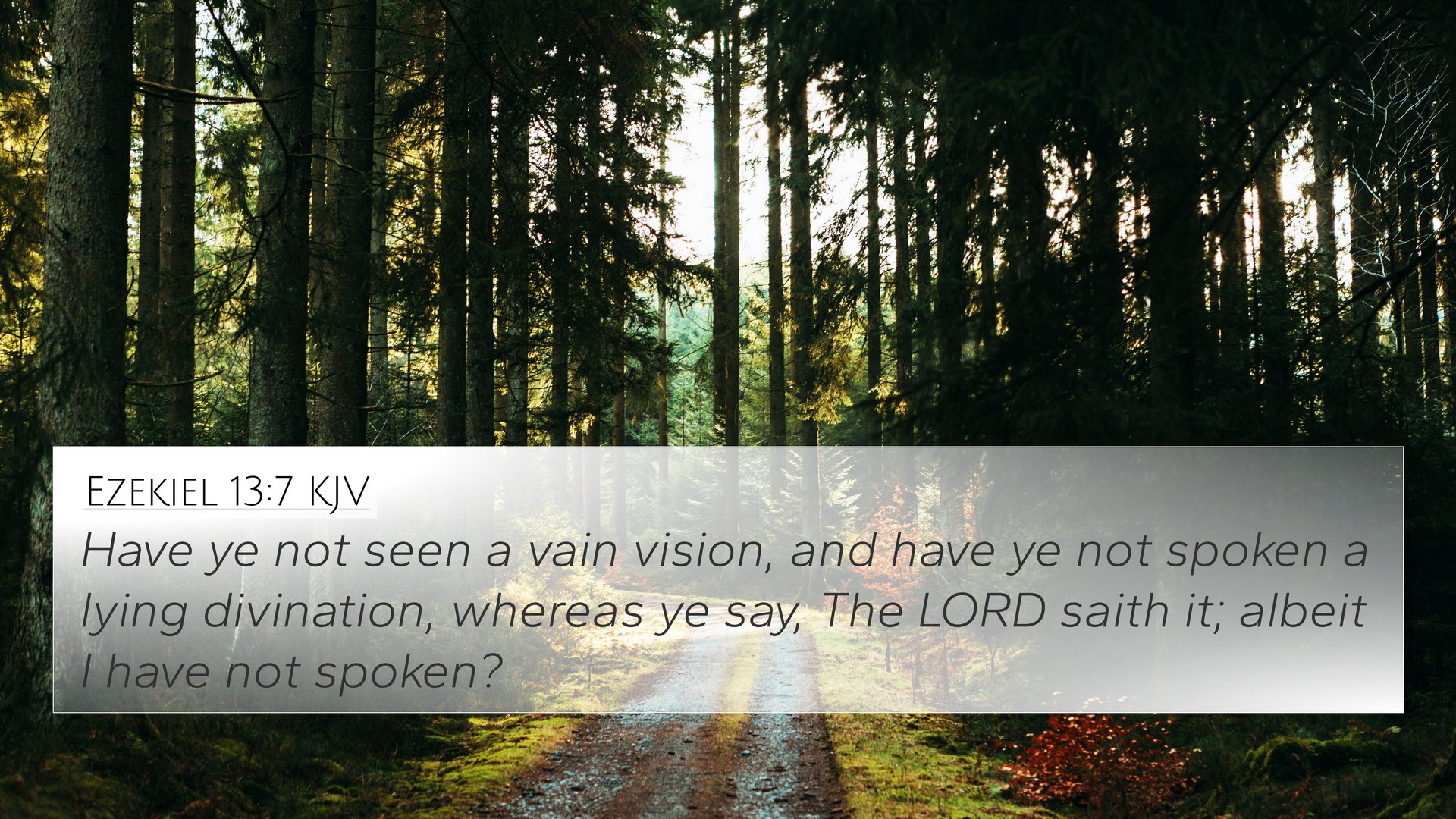Ezekiel 13:7 - Interpretation and Meaning
Ezekiel 13:7 states, “Have ye not seen a vain vision, and have ye not spoken a lying divination, whereas ye say, The Lord saith it; albeit I have not spoken?” This verse addresses the topic of false prophecies and false prophets, emphasizing the importance of discerning true messages from God.
Understanding the Context
Ezekiel, a prophet during the Babylonian exile, often confronted leaders and false prophets who led the people astray with their deceptive messages. This verse signifies God's challenge to those claiming to speak on His behalf without His endorsement.
Insights from Public Domain Commentaries
Matthew Henry's Commentary
Matthew Henry notes that this passage underscores the seriousness of proclaiming a message in God's name when He has not actually spoken. The responsibility of speaking truthfully is emphasized, as false prophets mislead the people and disrupt their relationship with God.
Albert Barnes' Notes
Albert Barnes elaborates on the dangers of false visions and the ramifications of claiming divine inspiration falsely. He stresses that the behavior of these prophets not only misleads individuals but can lead entire communities away from God’s will.
Adam Clarke's Commentary
Adam Clarke reflects on the implications of declaring false declarations as true prophecies. He emphasizes the accountability of those who misrepresent God's voice, advocating for a sincere and genuine practice of prophecy that aligns with divine truth.
Key Themes and Messages
- The Weight of Prophetic Responsibility: Those who declare messages from the Lord are held to a higher standard, and the consequences of misrepresentation are grave.
- The Nature of False Prophetic Claims: False visions and lying divinations bring harm and confusion to the faithful, leading them away from God.
- The Call for Discernment: Believers are urged to exercise discernment in evaluating the messages they receive and to hold any prophetic word up to the standard of God's established truth.
Cross-References for Deeper Study
To further understand the implications of Ezekiel 13:7, consider the following cross-references:
- Deuteronomy 18:20-22: Instructions on how to recognize a true prophet.
- Jeremiah 14:14: God speaks against false prophets claiming to proclaim His messages.
- Matthew 7:15: Jesus warns about false prophets in sheep's clothing.
- 1 John 4:1: Believers are encouraged to test every spirit to see whether they are from God.
- Micah 3:11: Critique of prophets who teach for a reward but do not speak the truth.
- 2 Peter 2:1: Peter warns the church about false teachers who secretly bring in destructive heresies.
- Acts 20:29-30: Paul cautions the Ephesian church about savage wolves rising among them.
Practical Application
This verse serves as a reminder for both leaders and followers in faith communities to remain vigilant and discerning. Here are some practical steps:
- Engagement with Scripture: Regularly study the Bible to understand its teachings and identify truths from falsehoods.
- Seeking God’s Guidance: Before acting upon revelations claimed to be from God, pray for wisdom and clarity.
- Accountability in Teaching: Leaders should be held accountable for the teachings they profess and should always point back to Biblical foundations.
Thematic Connections and Further Exploration
The themes presented in Ezekiel 13:7 open up a rich inter-Biblical dialogue regarding the nature of prophecy and truth. By exploring these themes, one can connect this passage with teachings across both the Old and New Testaments. Use tools for Bible cross-referencing, such as concordances and thematic studies, to deepen your understanding of these connections.
In summary, Ezekiel 13:7 serves as a strong admonition against false prophecies and a call to discernment, urging believers to seek and uphold divine truth as revealed in Scripture. Engage with additional resources to strengthen your understanding and practice of the Word.





